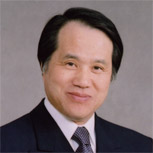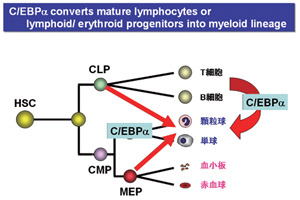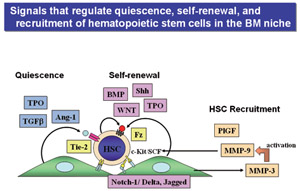HOME > Program Members > Yasuo Ikeda

Yasuo Ikeda

Professor,Department of Internalmadicine,Graduate School of Medicine (~March,2009)
Waseda University Center for Advanced Biomedical Sciences Faculty of Science and Engineering (April,2009~)
Yasuo Ikeda, MD, PhD
yikeda@sc.itc.keio.ac.jp
http://www.keio-hematology.jp/
Theme
Differentiation of hemtopoietic cells is described as a sequential process of cell fate decision originating from hematopoietic stem cells (HSC). HSCs reside in specialized microenvironments of the bone marrow called 'niche's, and signals mediated by the niches maintain the HSCs in the immature state. HSCs are recruited into the cell cycle by the niche signals under the myelosuppressive state, and the subsequent differentiation processes are regulated by various hematopoietic-specific transcription factors, such as C/EBPα and PU.1. These transcription factors dictate lineage specification at various stages of differentiation. The process of differentiation is considered to be irreversible and it has been believed that mature hematopoietic cells do not change their phenotype after they have once differentiated. However, we have shown that even mature hematopoietic cells retain plasticity and can be reprogrammed into other lineages by provision of the appropriate stimuli.
We are currently attempting to elucidate the molecular mechanisms underlying HSC physiology and hematopoiesis, and to apply the knowledge gained to artificially regulate the differentiation of hematopoietic cells. Our goal is to 1) generate reprogrammed multipotent progenitors from mature hematopoietic cells, 2) induce ex-vivo expansion of HSCs, both of which would be extremely useful for regenerative medicine and cellular therapies in the future.
Research activities
We have been investigating the role of transcription factors in hematopoietic differentiation. The C/EBP and PU.1 families are well-known transcription factors critical for myeloid differentiation, whose ablation in the mouse genome was found to lead to differentiation block in the early myeloid stage. We have reported that C/EBPα can induce transdifferentiation into the myeloid lineage when it is ectopically expressed in lymphoid or erythroid cells. This is one of the first studies to report that differentiated hematopoietic cells retain developmental plasticity and can be reprogrammed into other lineages by the activation of a single transcription factor. We have also shown that C/EBPα or PU.1 are functionally expressed in hematopoietic stem cells (HSCs) and negatively regulate their self-renewal capacity.
In a search for HSC regulatory factors supplied by the niche, we discovered that TIMP-3, an endogenous inhibitor of matrix metalloproteinases, plays a critical role in the self-renewal and quiescence of HSCs. TIMP-3 is induced in response to myelosuppressive stress in the bone marrow niches and recruits quiescent HSCs into the cell cycle. This indicates that TIMP-3 contributes to the recovery of the bone marrow after myelosuppression.

Fig.1 Lineage conversion by C/EBPα
Ectopic expression of C/EBPα can induce lineage conversion of lymphoid/ erythroid cells into the myeloid lineage.

Fig.2 Regulation of hematopoietic stem cells by niche signals
A variety of cytokines, growth factors and membrane associated proteins expressed in the niche regulate quiescence, self-renewal,and recruitment of hematopoietic stem cells.
Selected Paper
- Yamane A, Nakamura T, Suzuki H, Ito M, Ohnishi Y, Ikeda Y, Miyakawa Y:Interferon-alpha2b-induced thrombocytopenia is caused by inhibition of platelet production but not proliferation and endomitosis in human megakaryocytes. Blood 112, 542-550, 2008.
- Mori T, Aisa Y, Watanabe R, Yamazaki R, Kato J, Shimizu T, Shigematsu N, Kubo A, Yajima T, Hibi T, Ikeda Y, Okamoto S: Long-term follow-up of allogeneic hematopoietic stem cell transplantation for de novo acute myelogenous leukemia with a conditioning regimen of total body irradiation and granulocyte colony-stimulating factor-combined high-dose cytarabine. Biol Blood Marrow Transplant 14: 651-657, 2008.
- Nogami W, Yoshida H, Koizumi K, Yamada H, Abe K, Arimura A, Yamane N, Takahashi K, Yamane A, Oda A, Tanaka Y, Takemoto H, Ohnishi Y, Ikeda Y, Miyakawa Y: A novel, small non-peptidyl molecule butyzamide activates human thrombopoietin receptor and promotes megakaryopoiesis. Haematologica 93, 1495-1504, 2008.
- Kimura N, Miyakawa Y, Kohmura K, Umezawa K, Ikeda Y, Kizaki M: Targeting NF-kB and induction of apoptosis by novel NF-kB inhibitor dehydroxymehylepoxyquinomycin (DHMEQ) in Burkitt lymphoma cells. Leuk Res. 31, 1529-1535, 2007.
- Mori T, Aisa Y, Yokoyama A, Nakazato T, Yamazaki R, Shimizu T, Mihara A, Kato J, Watanabe R, Takayama N, Ikeda Y, Okamoto S: Total body irradiation and granulocyte colony-stimulating factor-combined high-dose cytarabine as a conditioning regimen in allogeneic hematopoietic stem cell transplantation for advanced myelodysplastic syndrome: a single-institute experience. Bone Marrow Transplant 39: 217-221, 2007.
Copyright © Keio University. All rights reserved.
